World Geography And Politics Daily News | 21 May 2023

Views (218)
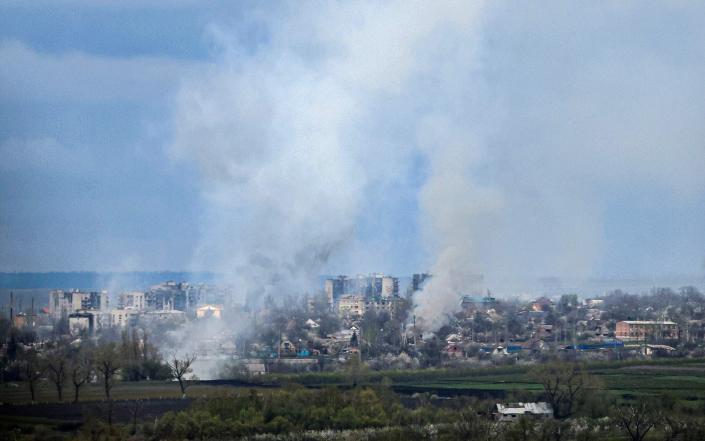
Nigeria's Muhammadu Buhari leaves legacy of kidnapping, inflation and debt
President Muhammadu Buhari was elected in 2015 on promises to make the country safer and tackle corruption.
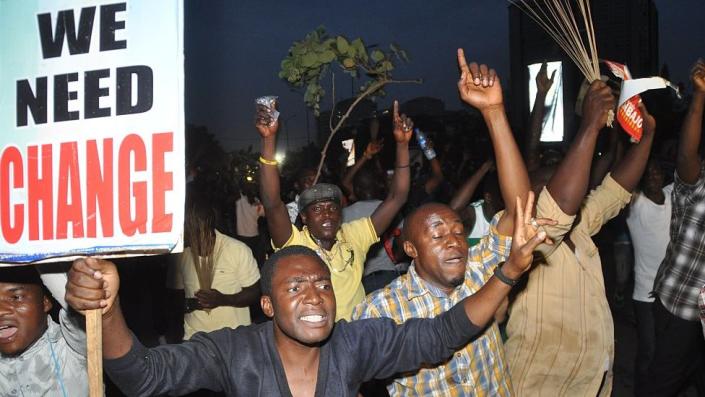
When he steps down next week President Muhammadu Buhari will be leaving Nigerians less secure, poorer and more in debt than when he came to office in 2015.
The former military ruler became president after winning a momentous election which saw the defeat of underperforming incumbent Goodluck Jonathan.
Riding a wave of optimism that change was possible, he was supported by a powerful coalition and had the reputation of being a hard-man soldier, who would get things done.
After Mr Buhari's brief stint in charge in the 1980s, his second coming was on the back of promises to curtail the rampaging Islamist insurgency in the north-east and tackle widespread corruption.
He is the last of a generation of British-trained military men who went on to govern the country.
But the 80-year-old's two four-year terms have left many disappointed.
There have been gains in tackling Boko Haram and other extremist groups in the north-east, aided by improved military hardware from the US.
While the groups still carry out attacks on communities and military installations in the region, it is a big improvement from the years when they operated freely and controlled a large portion of Nigerian territory.
Mr Buhari also utilised Chinese loans to upgrade the ailing road and rail infrastructure, building a new port in Lagos, completing a crucial bridge in the south-east, and passing important electoral and oil-sector laws.
But whatever gains have been recorded in the north-east against the Islamist militants have been eroded by the emergence of equally violent groups in other parts of the country under his watch.
Clashes between farmers and cattle herders from the Fulani ethnic group, which had simmered for years, were allowed to boil over into deadly armed confrontations with an ethnic element, as the government ran out of ideas to solve the problem of where animals could graze.
Mr Buhari, a Fulani from northern Nigeria, was accused of bias in the conflict and his proposal of grazing reserves for the herders were rebuffed by powerful southern state governors who saw it as a land-grabbing tactic.
Some of the armed groups created by the farmer-herder crisis have since transitioned into violent motorcycle-riding bandits targeting communities in the north-west and central states. These groups have helped turn a lucrative kidnap-for-ransom business into a behemoth that now extends countrywide.
It took hold during the first decade of the century when oil workers were kidnapped in the Niger Delta and blossomed under Mr Buhari's watch as the targets changed.
For instance, thousands of school children were abducted between December 2020 and September 2021, according to the UN's children's organisation, Unicef. That eclipsed the 270 girls seized from a school in Chibok who made global headlines in 2014 - a crime that was a crucial factor in Mr Buhari defeating Mr Jonathan.
"I thought that as a former military ruler he would have the solution to Nigeria's security challenges," Musa Ahmadu a farmer now living in the north-western state of Kano, told the BBC.
Mr Ahmadu, originally from the president's home state of Katsina, abandoned his land and fled to neighbouring Kano alongside thousands of others because of the activities of armed groups in the region.
Many also believe that Mr Buhari has mishandled the situation thrown up by separatist leader Nnamdi Kanu.
Mr Kanu heads the Indigenous People of Biafra (Ipob), a group seeking secession in the south-east which is proscribed by the government.
He is a charismatic figure with a huge appetite for sensationalism which he fed devotees via his internet radio station.
Ipob was largely ignored by many Nigerians until Mr Kanu was first arrested for treason by the Buhari government in 2015. A subsequent state-sanctioned attack on his home marked the beginning of an armed confrontation that has spiralled out of control, claiming hundreds of lives in the process.
After escaping in 2017, he was abducted in unclear circumstances abroad and returned to Nigeria in 2021 to face trial. A judge has ordered his release as the process of his return was illegal but authorities continue to hold him.
These security challenges made many question Mr Buhari's handling of a sector that was supposed to be his area of expertise.
"I am surprised at the level of embarrassment he has brought to his constituency, the military, despite all the promises he made," said retired Colonel Hassan Stan-Labi, a security analyst.
"How can you fail in your own area of specialty?" he asked.
The countrywide insecurity under Mr Buhari has largely been muted in the oil-rich Niger Delta where oil-militants and sea pirates held sway in the past.
But that peace seems to have coincided with a period of large-scale oil theft, with the government accused of looking away while different groups in the region steal crude from the pipelines. This led to Nigeria's production plunging to a 30-year low in 2022.
The shocking discovery last October of a kilometres-long pipeline used to steal oil was described by commentators as "nearly impossible" without help from authorities.
That theft on such a scale happened directly under Mr Buhari, who also doubled as Nigeria's petroleum minister, undermined his claim to be fighting graft, Salaudeen Hashim of anti-corruption NGO Cleen Foundation, told the BBC.
Mr Buhari's integrity was also impugned by his frequent medical trips to the UK despite spending large sums to refurbish a clinic in the presidential villa.
This lack of transparency "drained taxpayers' monies, encouraged illicit financial flows and other corruption-enabling activities the administration preached against", Auwal Rafsanjani, the head of Transparency International in Nigeria, told the BBC.
Mr Rafsanjani scored the administration four out of 10 in fighting corruption, and said Mr Buhari's appointment of people with ongoing corruption cases to his cabinet and his wife's long stays in expensive Dubai homes "contravened best practices by an administration that was fighting corruption and mismanagement".
As he leaves, Mr Buhari's handling of the Nigerian economy will most likely be remembered for his botched attempt earlier this year at redesigning the local currency.
"The small business we were doing was destroyed by that man," said a university graduate in Abuja who made money by supplying banknotes to her customers before the cash crisis.
Her anger was fuelled by a common problem in Nigeria - a lack of work among educated young people.
Currently one in three Nigerians who want to work are unable to find a job. Before Mr Buhari took over that figure was less than one in 10.
The government has blamed a drastic drop in oil prices in its early days, the Covid pandemic and Russia's war in Ukraine.
But some of its policies, such as currency restrictions and closing the land borders to boost local production, have contributed towards record inflation that has made millions poorer and depleted a once burgeoning Nigerian middle-class.
Last week, with the end in sight, Mr Buhari pleaded with lawmakers to hurriedly approve an $800m (£640m) loan from the World Bank. Nigeria's public debt could pass $150bn this year - when he took over it stood at a little over $60bn.
His borrowing spree has drawn warnings from the World Bank that Africa's largest economy was using 96% of its revenue to service debts.
But the huge debt has been defended by the administration who say it is within acceptable limits, pointing to cash payments to poor people as justification for some of the loans.
"These welfarist interventions give a window into the kind soul of the president, a man some people have not bothered to discern, dissect and decipher," presidential spokesman Femi Adesina wrote last week.
Like him, many in the administration insist it has had a good eight-year run. Although both he and his wife have apologised for not delivering on promises made, Mr Buhari has said that he tried his best.
"I want [Nigerians] to analyse how things were when we came in and how they are when we're leaving," he responded when asked about his legacy last year.
The fact is that Nigerians were safer, better off and less in debt before Mr Buhari took over, and many will remember him for presiding over the toughest eight years they might ever face.
Japan's Toyota discloses improper crash tests at Daihatsu subsidiary
Toyota has found improper crash tests for a model and suspended shipments, in the latest in a series of embarrassing woes plaguing Japan’s top automaker. The latest problem, disclosed late Friday, affects 56,111 Toyota Raize hybrid vehicles produced by Daihatsu Motor Co., a manufacturer specializing in small models that is wholly owned by Toyota. It also affects 22,329 vehicles sold as the Daihatsu Rocky, according to the automakers.

TOKYO (AP) — Toyota has found improper crash tests for a model and suspended shipments, in the latest in a series of embarrassing woes plaguing Japan’s top automaker.
The latest problem, disclosed late Friday, affects 56,111 Toyota Raize hybrid vehicles produced by Daihatsu Motor Co., a manufacturer specializing in small models that is wholly owned by Toyota.
It also affects 22,329 vehicles sold as the Daihatsu Rocky, according to the automakers. The vehicles were all sold in Japan.
In the faulty crash tests, results for a pole used to measure impact on the left side were used for the right, when both sides had to be tested, Daihatsu said.
Just a week ago, Toyota Motor Corp. acknowledged there had been a data breach at its online Connected service, run by a group company. The breach spanned a decade, meaning that drivers’ information on more than 2 million vehicles had been at risk for leaks. No breaches were reported.
Last month, a separate crash test problem for Daihatsu models sold abroad was disclosed, affecting 88,123 vehicles. A further review found wrongdoing in the Japan market as well, according to the automakers.
The earlier problem affected the Toyota Yaris ATIV sold in Thailand, Mexico and some Gulf countries, Perodua Axia sold in Malaysia and Toyota Agya in Ecuador.
Daihatsu apologized at that time and set up a third-party team to investigate. It did not issue a recall, noting the vehicles were safe to drive, but it expressed deep remorse it had violated inspection standards.
The Toyota models were supplied by Daihatsu under the OEM system, common in the industry, in which products manufactured by another company get sold with another nameplate.
Toyota, which sells about 10 million vehicles every year, boasts a record for pristine quality, centered around a production system that empowers the individual worker.
The latest problems don’t involve recalls. But Toyota went through a period of announcing recall after recall over several years more than a decade ago, covering a wide range of defects, including faulty floor mats, sticky gas pedals and glitches in braking software, affecting millions of vehicles.
The recall fiasco in 2009 and 2010 had Toyota paying $48.8 million in fines in the U.S. for its slow response. Toyota officials have repeatedly promised to be quicker and more transparent.
Management has renewed its “commitment to manufacturing with integrity,” the company based in Toyota city, central Japan, said in its latest statement.
“All our group companies, including Toyota, have begun a thorough review to work toward a complete reaffirmation of our governance system. We will work with Daihatsu to tackle this issue,” it said.
___
Russia puts ICC prosecutor on wanted list following Putin warrant: reports
Russia has placed the prosecutor for the International Criminal Court (ICC) on a wanted list in response to the court issuing an arrest warrant for Russian President Vladimir Putin, Russian state-run media reported. RIA Novosti reported on Saturday that British prosecutor Karim Khan was placed on the list by the Russian Internal Affairs Ministry, having…

Russia has placed the prosecutor for the International Criminal Court (ICC) on a wanted list in response to the court issuing an arrest warrant for Russian President Vladimir Putin, Russian state-run media reported.
RIA reported that the judges were charged with deliberate unlawful detention and preparation for an attack on a representative of a foreign state.
The other official that ICC has issued an arrest warrant for is Maria Alekseyevna Lvova-Belova, who serves as commissioner for children’s rights in the Russian president’s office. Authorities have alleged that she “bears individual criminal responsibility” for her role in the deportation scheme.
Putin is unlikely to be brought into an international court of law to face the charges against him, but the warrant was still a major denunciation of Putin on an international level.
Russia does not accept the ICC’s authority, but the court has argued it can charge Russian officials because Ukraine has accepted its jurisdiction to investigate crimes committed by Russia in Ukrainian territory.
Uvalde families dig in for new test of gun industry protections
After Mayah Zamora was shot and wounded at Robb Elementary School, her family did what many mass shooting survivors do: They sued. “Mainly what we are looking for is some sort of justice," said Christina Zamora, Mayah's mother. As the grim frequency of gun violence continues, both the U.S. government and gun manufacturers have reached large settlements in recent years following some of the nation's worst mass shootings.
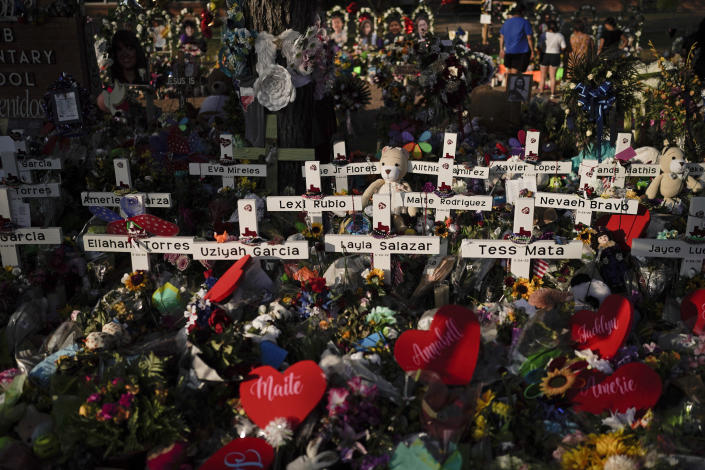
“Mainly what we are looking for is some sort of justice," said Christina Zamora, Mayah's mother.
The lawsuits, relatives and victims of mass shootings say, are an effort to get accountability and prevent more attacks — by forcing reforms, hurting the gun industry's bottom line and strengthening background checks after lapses failed to stop gunmen from buying weapons.
It comes as attorneys say the narrow path for victims to bring lawsuits has begun to widen, including for families in Uvalde, who on Wednesday will mark the one year since the most deadly school shooting in Texas history.
“I think there are more opportunities for accountability than maybe there were five to 10 years ago,” said Eric Tirschwell, executive director for Everytown for Gun Safety, which for years has brought lawsuits against the gun industry and is also involved in the Uvalde case.
In Uvalde, victims have also accused Daniel Defense, the maker of the weapon used in the attack, of dangerous marketing. The company has denied that in court, and gun industry groups have broadly rejected the argument since the Sandy Hook settlement.
"The commercial speech is still protected speech," said Mark Oliva, managing director for public affairs at the National Shooting Sports Foundation.
The lawsuits in Uvalde are still in the early stages and not all families sued. For the Zamoras, they decided to join only after Mayah was released from the hospital, which was not until more than two months after the shooting and dozens of surgeries. Next year, her parents say, they hope she can return to school in person.
After the Uvalde shooting, Sandy and Lonnie Phillips drove to the town and shared with families their own experiences of suing the gun industry: a decision that ended with them declaring bankruptcy after losing and a court ordering them to pay more than $200,000 to the defendants' attorneys.
Their daughter, Jessica, was killed in the 2012 movie theater shooting in Aurora, Colorado. Last month, the couple joined Colorado Gov. Jared Polis as the Democrat signed laws aimed at making it easier to sue the gun industry, one of which prevents plaintiffs from having to pay if their lawsuits are dismissed.
"They’re not aware of what’s coming down the pike," Lonnie Phillips said of victims who bring lawsuits. "They only know that they lost their child and somebody has to pay."
___
Bleiberg reported from Dallas. Associated Press writer Jonathan Mattise in Nashville, Tennessee, contributed to this report.
Nottingham doctor fears for mother stuck in Sudan warzone
Khansa Adam says she wants the government to help get her mother away from the fighting in Khartoum.
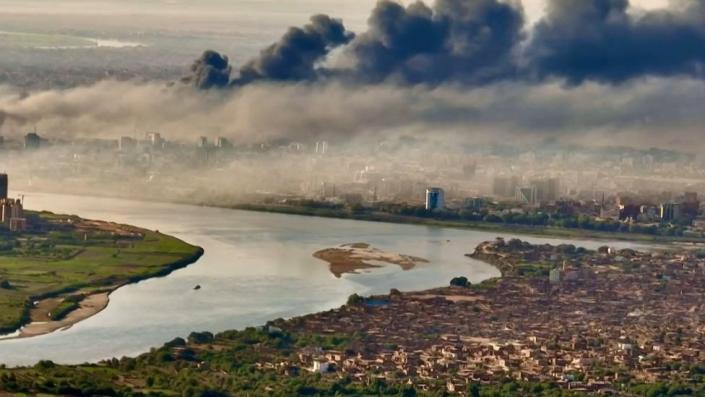
A doctor from Nottingham is desperately trying to get her mother out of Sudan as intense fighting in the country continues.
Dr Khansa Adam said Batoul Dawelbait had been unable to join an evacuation flight because her key documents were locked in a visa office in Khartoum.
The registrar, who works at the Queen's Medical Centre, said she feared for her mother's life.
The Home Office said it was unable to comment on individual cases.
Dr Adam said her mother, 70, had been cleared to come to the UK before the conflict began but had been unable to get her passport and visa from the office which closed indefinitely when the fighting started on 15 April.
She told the BBC she had heard gunshots during phone conversations with her mother.
She said: "She tries to reassure me and she says it (the fighting) is far (away) but it is clear it is not.
"I do hear bullets in the background.
"There was shrapnel flying and mum had a bullet going through her window.
"She is very depressed and scared."
Dr Adam said her mother had applied successfully to come to the UK before the civil war began but, without her passport and visa, she was stuck in Khartoum,
She added: "In my view, she is being held in a warzone against her will because she cannot get her documents.
"I do appreciate you cannot open a visa centre when fighting is raging the way it is in Sudan but she could have been evacuated. She still can be evacuated."
Dr Adam said her mother had an email confirming her right to come to the UK which, she hoped, would be enough to allow her to get to a safe neighbouring country while onward travel was arranged.
She added: "I am angry and I am worried to death."
Hundreds of civilians have been killed, thousands injured and it is thought more than a million people have been displaced.
There have been airstrikes and shelling in Khartoum.
Dr Adam said her mother's home had been without power and water for a week and she did not have access to medication.
She added: "I have gone through loss - I lost my dad in 2019 - and the last thing I want is to go through this again when I don't need to."
She said she was doing all she could to get Mrs Dawelbait to the UK but wanted action from the government.
A Home Office spokesperson said: "The UK has carried out by far the longest and largest evacuation of any Western country from Sudan, bringing 2,450 people to safety.
"It has always been the case that the evacuation has been open to British nationals and their eligible family members, with a later exemption for NHS clinicians."
Russian troops have taken control of Bakhmut, Kremlin says
Russian troops have been congratulated by Vladimir Putin after the Kremlin claimed they had on Saturday taken control of the eastern Ukrainian city of Bakhmut.
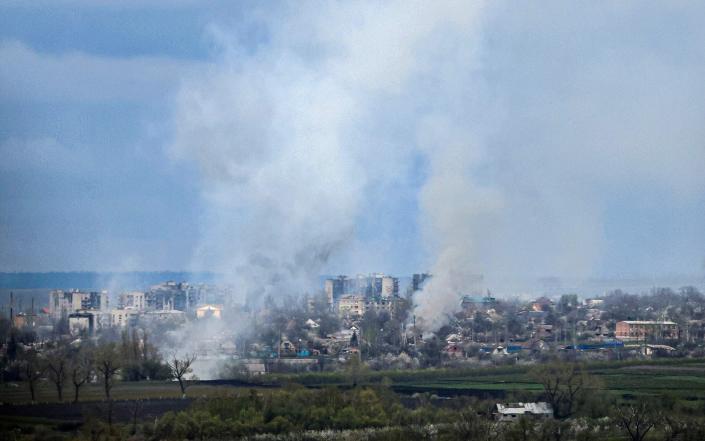
Russian troops have been congratulated by Vladimir Putin after the Kremlin claimed they had on Saturday taken control of the eastern Ukrainian city of Bakhmut.
Referring to Bakhmut by its Soviet-era name, Artyomovsk, the Russian defence ministry said: "As a result of offensive actions by Wagner assault units, supported by artillery and aviation of the Southern Group of Forces, the liberation of Artyomovsk has been completed."
President Putin on Saturday said troops who had distinguished themselves in the battle would be given awards.
Victory for the Russians would mark an end to ferocious and bloody fighting that has raged for months and come at significant cost to Moscow.
Earlier on Saturday, the head of Russia’s Wagner mercenary group said his troops had captured the whole of the city, a claim that Ukrainian officials immediately denied.
Yevgeny Prigozhin also said on Saturday that his forces would begin withdrawing from the destroyed city in the Donbas region, eastern Ukraine, from Thursday.
“The operation to capture Bakhmut, ‘The Bakhmut meat grinder’, lasted 224 days,” he said in a speech posted on his Telegram channel. “For 224 days the guys stormed the city. There were only Wagner mercenaries there.”
Within minutes, Ukrainian officials, who have said for the past 10 days that they have been taking ground from Russian forces in Bakhmut, denied Mr Prigozhin’s claim.
“It’s not true. Our units continue to fight in Bakhmut,” said Sergei Cherevaty, a spokesman for Ukraine’s eastern military group.
Mr Prigozhin recorded his six-minute speech standing near a row of destroyed buildings. Artillery could be heard booming in the background and nine impassive mercenaries stood around him holding Wagner and Russian flags.
Mr Prigozhin, who has previously admitted that Bakhmut holds little strategic value, had promised to hand Vladimir Putin his first notable battlefield victory against Ukraine in more than a year.
Analysts have said that Wagner has lost tens of thousands of men fighting in Bakhmut, mainly convicts recruited from Russian prisons.
On Saturday, he once again blamed Sergei Shoigu, the defence minister, and Valery Gerasimov, the head of the Russian military, for causing excess deaths.
He had previously threatened to quit the battle for Bakhmut if the defence ministry did not send his fighters more ammunition.
Earlier, the British Ministry of Defence said that Ukrainian advances around Bakhmut were sucking in Russian forces and exhausting them before Kyiv goes on the offensive.
0 Likes
